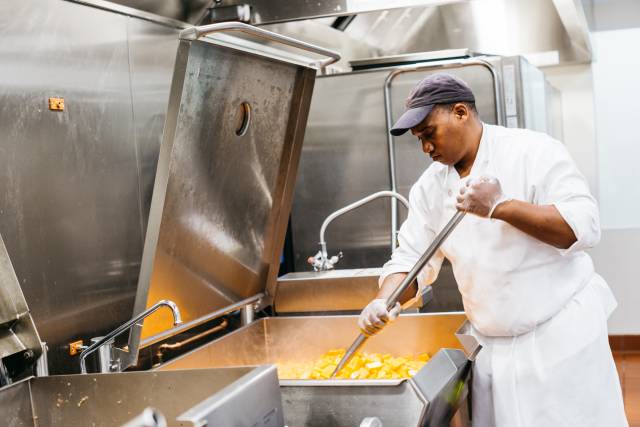You are here
Fighting Hunger, Together
Good nutrition is fundamental to good health. Across the country, the CDC Foundation is working with partners to foster healthy communities by reducing hunger and improving nutrition and physical activity in the United States.
Through an initiative called the Hunger, Nutrition and Health Action Collaborative, the CDC Foundation is committed to drive collaboration, foster innovation and amplify initiatives that support ending hunger across the United States. Building strong partnerships that bring resources and expertise together is a key element of the approach.
And while healthy nutrition for pregnant people is a critical to ending hunger across the U.S., programs focused on maternal and child health are sometimes overlooked. These programs are instrumental in creating and supporting healthier generations by providing pregnant people with the food they and their babies need to thrive.
To support this important population, Vitamix Corporation and its philanthropic arm, the Vitamix Foundation, has committed roughly $4 million in product donations and grant funding to organizations advancing access and enjoyment of whole food nutrition, with a focus on expectant individuals and young children. Based in Ohio, the Vitamix Foundation supports a wide range of initiatives, including combating preterm birth, promoting breastfeeding and addressing critical issues like maternal mortality, using healthy nutrition to foster optimal prenatal development and maternal outcomes.
Because the early years of a child’s life are critical to long term development, focusing on maternal health is vitally important. Community Servings, a CDC Foundation partner in Massachusetts and Rhode Island, does so by providing a medically tailored meal-delivery service to individuals with high-risk pregnancies, including individuals who have gestational diabetes or heart conditions. Seeing access to nutritious food as a fundamental right, Community Servings actively engages healthcare and policy leaders to advocate for integrating medically tailored meals into the public and private healthcare models and systems, to reach beyond pregnant people to include all who are food insecure.
The Cleveland Clinic, a nonprofit academic medical center based in Northeast Ohio, also focuses their efforts on food-insecure, pregnant individuals to create a healthy start for children. Currently serving 120 pregnant people, the program provides $200 vouchers for dietician-approved groceries to be delivered directly to individuals at their homes.
“We know that for a pregnant woman or a newly delivered mother, getting to and from the grocery store can be quite a challenge,” said Rosemary Miles, a director at the Cleveland Clinic. “Having the option of having their food delivered right to their doorstep alleviates that worry and stress of how they're going to get food for not only themselves but their child and their families.”
These are just some examples of organizations doing great work in the maternal and child health field, taking up a challenge issued by the White House in September 2022 for healthcare groups and foundations around the country to further the nation’s fight against hunger and food insecurity. The Hunger, Nutrition and Health Action Collaborative is fighting hunger by fostering with like-minded partners like these, and others, committed to ending hunger in America.
“We feel like you can do more together than separately,” Natalie Haynes, the executive director of the Vitamix Foundation, said. “These problems are big, and it will take all of us to overcome them.”


